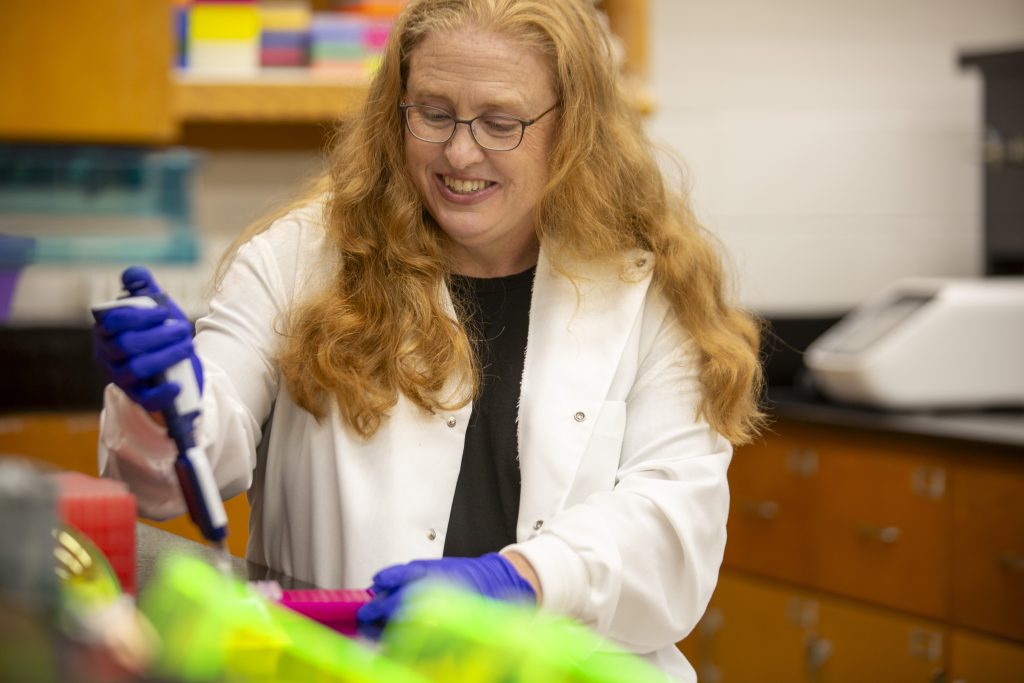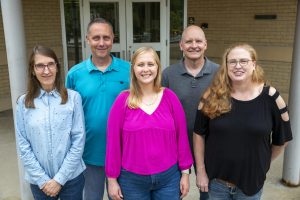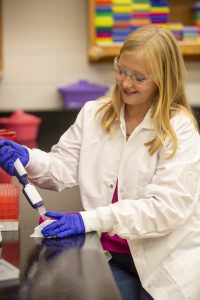
A University of Missouri College of Agriculture, Food and Natural Resources (CAFNR) researcher is helping enhance agricultural productivity and sustainability while supporting the conservation of endangered species.
As co-leader of the multi-organizational Ruminant Telomere-to-Telomere Consortium (RT2T), Stephanie McKay, associate professor of animal sciences, is assisting the production of complete and precise genomic resources for a range of ruminant species — animals that chew cud. This includes cattle, sheep, goats and deer. The mapping could lead to valuable insights to improve future ruminant genetics.
“T2T gapless assemblies provide access to new genomic sequence that has been previously unavailable,” McKay said. “This information will allow us a better understanding of chromosome structure and evolution and generate resources that will facilitate future research regarding genetic and genomic strategies for improved livestock production.”
Historically, studying the genetics of ruminant animals has been challenging due to missing, incomplete and/or fragmented reference genome sequences. These limitations have impeded a comprehensive understanding of genetic traits and behaviors across the ruminant phylogenetic group. However, the RT2T project, leveraging cutting-edge sequencing technologies and collaborative expertise, aims to provide a foundation that will eliminate many of these barriers.
Complete understanding of the genome structure of these animals can unlock new ways to enhance breed quality, disease resistance and overall productivity, which are crucial for the sustainability of the agricultural sector.

In addition to McKay, MU faculty working on the project include Robert Schnabel, associate professor of animal sciences; Christine Elsik, professor of animal sciences; and Jonathan Green, associate professor of animal sciences. Elsik is the lead of the annotation working group, and Schnabel is co-lead of the variant discovery and population group. The project, published in Nature Genetics, describes how the worldwide team of collaborators will leverage advanced sequencing technologies to analyze the genomes of ruminant species. These methods provide a comprehensive view of the genome, including previously hard-to-sequence regions like centromeres and telomeres (key structures within chromosomes, each playing crucial roles in cell division and maintaining genetic stability), thus offering a complete genetic blueprint of these animals.
RT2T also embraces an open science model, ensuring that the data and results produced are freely accessible to the global research community. This approach advances collaboration, derives input and guidance from many perspectives, and encourages the engaged participation necessary to accelerate scientific discoveries and drive innovation in agricultural research, according to McKay. This collaborative method enables applications such as improving breeding practices and enhancing conservation efforts. Scientists worldwide can access this data to conduct further studies, thereby fostering innovations that could reshape farming practices and animal breeding.
In addition to agricultural benefits, the comprehensive genome data produced by the RT2T can play a critical role in conservation efforts. High-quality genomic information is essential for managing the genetic variety of endangered ruminant species and developing strategies to improve their populations’ survival chances.
Understanding the complete genome could help identify genetic vulnerabilities and strengths and aid in conservation planning.
As the RT2T project advances, McKay plays a pivotal role as not only co-leader of the RT2T project but as co-leader of the comparative methylome working group. In this role, McKay will lead the group examining comparative DNA methylation analysis, with will add depth to the understanding of the genomes.

As part of the University of Missouri’s “Mizzou Forward” initiative, and supported by the IT Research Support Solutions (RSS) team in the Divison of IT, resources have been allocated on to help satisfy the significant computational demands that will be required for the project.
About the Ruminant T2T Consortium
The Ruminant T2T (RT2T) Consortium is a multi-institution and interdisciplinary global collaboration of scientists with the aim of producing high quality genome sequence of as many extant species as possible in the ruminant clade for a large-scale comparison of the genetic drivers of observed phenotypes underlying the breadth within this clade. The overarching goals of the RT2T consortium titled RT2T: A Global Collaborative Project to Study Chromosomal Evolution in the Suborder of Ruminantia, has recently been published in the journal Nature Genetics. The data from this project will lay the foundation and enable analyses of complete genomes across the ruminant clade to gain a broader understanding of function and evolution. This project is being jointly led by researchers Timothy Smith and Benjamin Rosen at USDA Animal Research Station, Rachel O’Neill at University of Connecticut, Theodore Kalbfleisch at University of Kentucky, Stephanie McKay at the University of Missouri, and Brenda Murdoch at the University of Idaho. Funding from the intramural research program of the USDA National Institute of Food and Agriculture, grant No. 2023-67015-39000, allowed the consortium to meet and embark on this large project.